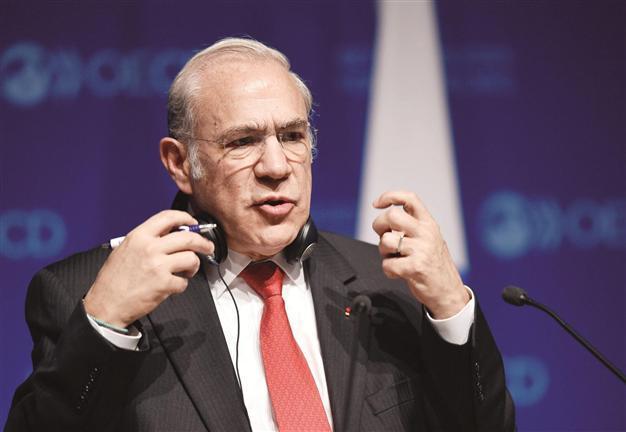OECD urges more reforms despite improving growth prospects
PARIS-Reuters

Members of the OECD, headed by Secretary-General Angel Gurria, cannot rely solely on low inflation and easy monetary policy to consolidate recovery.
Governments cannot rely solely on low inflation and easy monetary policy to consolidate recovery and boost employment even though growth prospects are improving in the world’s largest economies, the Paris-based OECD said on March 18.Growth remained too low to “repair and activate labor markets,” it said, noting that “abnormally low inflation and interest rates create a growing risk of financial instability with risk-taking and leverage driven by liquidity rather than fundamentals”.
Central banks would continue to drive recovery but the OECD warned against an exclusive reliance on monetary policy.
“A more balanced approach to policy is required with fiscal and, especially, structural policies providing synergistic support to monetary policy,” the think tank said.
In a regular overview of the world economy, it confirmed its forecast of 3.1 percent growth in the U.S. economy this year and 3.0 percent next, with forecasts for India, the euro zone and Japan raised the most.
It raised its eurozone growth forecast to 1.4 percent this year and 2.0 percent in 2016, in both cases up 0.3 points on its last forecast made in November 2014, thanks to an acceleration of activity in the zone’s largest economy, Germany.
Japan’s growth forecast rose to 1.0 percent this year and 1.4 percent next, up 0.2 points and 0.4 percent respectively.
For India, the OECD boosted its forecast significantly to 7.7 percent GDP growth in 2015, 1.3 percentage points higher than it was previously flagging, while for China it trimmed its forecast by 0.1 points to 7.0 percent in 2015.
“India is now expected to be the fastest-growing major economy in 2015-16, overtaking China,” said the OECD, which predicted growth accelerating to 8.0 percent in 2016 versus 6.9 percent in China.
For economies representing some 70 percent of the global economy: United States, eurozone, Japan, Britain, Canada, China, India, Brazil, the OECD said it was now expecting GDP growth of 4.0 percent in 2015, up 0.1 points from its previous November prediction.
















